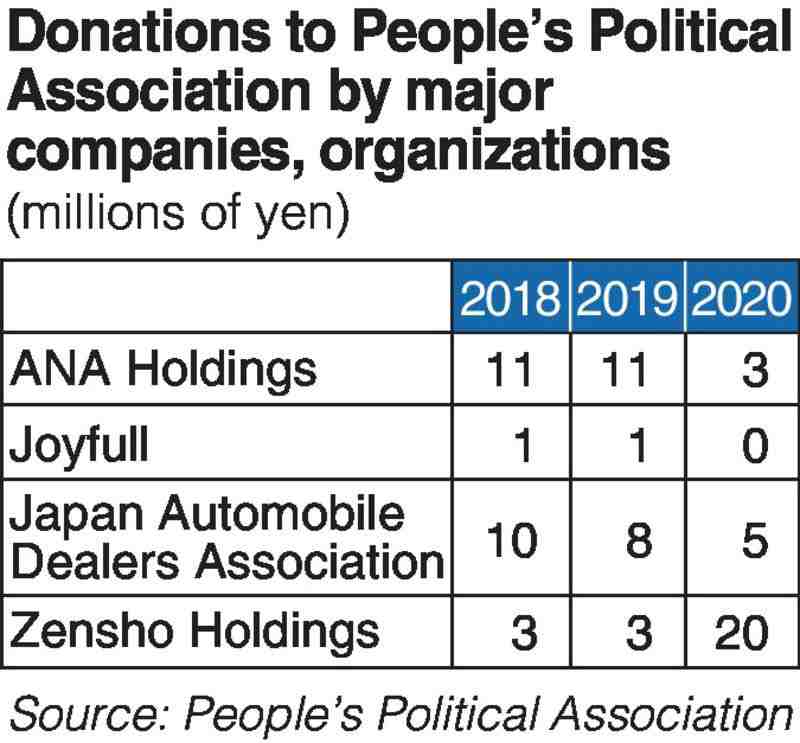
16:30 JST, December 29, 2021
Companies and organizations are starting to reduce their political contributions amid the spread of the novel coronavirus.
According to the 2020 political funds report unveiled in November, donations from the transportation and food and beverage industries showed particularly large declines from the pre-pandemic period. There were no contributions at all from some members of these industries, which were hit hard by states of emergency and other factors.
Among companies that continued to make political contributions even amid a difficult business situation, some expressed concern, with one hoping that the political world would help them maintain employment and consumption even if there is a sixth wave of infections.
The People’s Political Association, the political fund-managing organization for the ruling Liberal Democratic Party, received about ¥2.79 billion in contributions last year, down 3% from the previous year. A total of 179 companies and organizations reduced or stopped their political contributions, and 20% of this number lowered their contributions by at least ¥1 million.
In the airline industry, which saw a sharp decline in passenger traffic due to the pandemic, Tokyo-based ANA Holdings Inc. reported it made ¥3 million in political contributions last year, down 70% from ¥11 million in the previous year. A spokesperson for ANA Holdings said the reduction was inevitable, as its revenues dropped significantly.
Japan Airlines Co., also in Tokyo, reported a 20% drop in its corporate donations to ¥8 million.
The bus industry is also suffering from the slump in tourism. The Basu Kotsu Konwakai, the Nihon Bus Association’s political organization, donated ¥200,000 to the People’s Political Association last year, the same as the previous year. However, it reduced its purchase of tickets to fundraising parties for politicians to about a third of the previous ¥3.6 million.
“We can’t give what we don’t have,” said an official of the political organization.
In the food and beverage industry, Asahi Breweries, Ltd. of Tokyo reported a decline of ¥2 million in political contributions from the previous year to ¥3.66 million. Family restaurant operator Joyfull Co. of Oita suspended its annual political contributions of ¥1 million to the People’s Political Association because of a significant drop in sales amid the pandemic.
An official of another Japanese restaurant chain that also suspended its political contributions said it was due to cost-cutting efforts to maintain employment.
Some companies increased their contributions to the People’s Political Association from the previous year. Zensho Holdings Co., a Tokyo-based major restaurant chain operator, donated ¥20 million to the organization, nearly seven times more than in a usual year.
Although demand for takeaway products grew for Zensho, which operates the gyudon beef-on-rice restaurant chain Sukiya, the group’s overall sales and profits declined due to shortened business hours. A Zensho official emphasized that it provided generous support to the fund-managing organization in hopes that the political arena will make efforts to secure employment amid the instability of the pandemic.
Donations to political organizations led mainly by Diet members from ruling and opposition parties also fell sharply. Corporate donations to political organizations related to Diet members under the jurisdiction of the Internal Affairs and Communications Ministry totaled ¥206 million last year, down by half from the previous year.
Revenues from fundraising parties for politicians and other activities also fell by 30% to ¥5.012 billion.
Corporate donations to a chapter of a political party headed by an opposition member declined nearly 80% from the previous year. “We had no choice but to forgo our request for corporate donations as the pandemic is making it difficult to run a business,” an official at the chapter said.
Masaki Taniguchi, a professor of contemporary Japanese politics at the University of Tokyo, said: “Since companies tend to make the same amount of donations every year in Japan to maintain their relationship with politicians, a reduction or cancellation indicates the businesses are in a difficult situation. If the recession is further prolonged, the tendency to donate fixed amounts may become more fluid, and donations themselves may taper off.”
Top Articles in Politics
-

Japan PM Takaichi’s Cabinet Resigns en Masse
-

Sanae Takaichi Elected Prime Minister of Japan; Keeps All Cabinet Appointees from Previous Term
-

Japan’s Govt to Submit Road Map for Growth Strategy in March, PM Takaichi to Announce in Upcoming Policy Speech
-

LDP Wins Historic Landslide Victory
-

LDP Wins Landslide Victory, Secures Single-party Majority; Ruling Coalition with JIP Poised to Secure Over 300 seats (UPDATE 1)
JN ACCESS RANKING
-

Japan PM Takaichi’s Cabinet Resigns en Masse
-

Japan Institute to Use Domestic Commercial Optical Lattice Clock to Set Japan Standard Time
-

Israeli Ambassador to Japan Speaks about Japan’s Role in the Reconstruction of Gaza
-

Man Infected with Measles Reportedly Dined at Restaurant in Tokyo Station
-

Videos Plagiarized, Reposted with False Subtitles Claiming ‘Ryukyu Belongs to China’; Anti-China False Information Also Posted in Japan





















